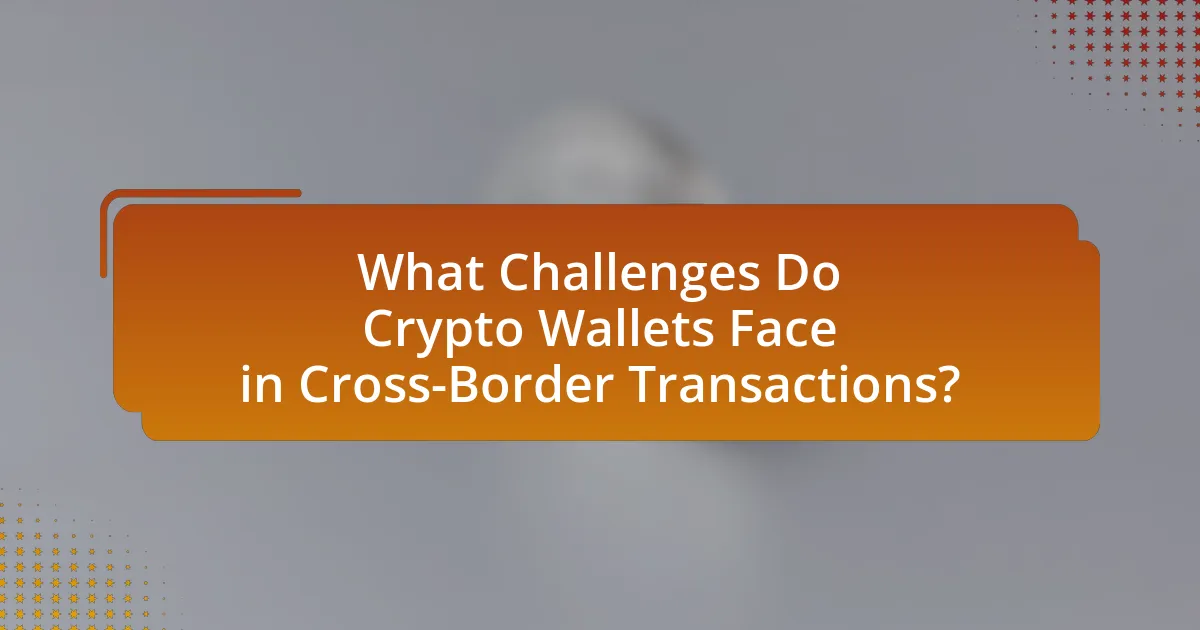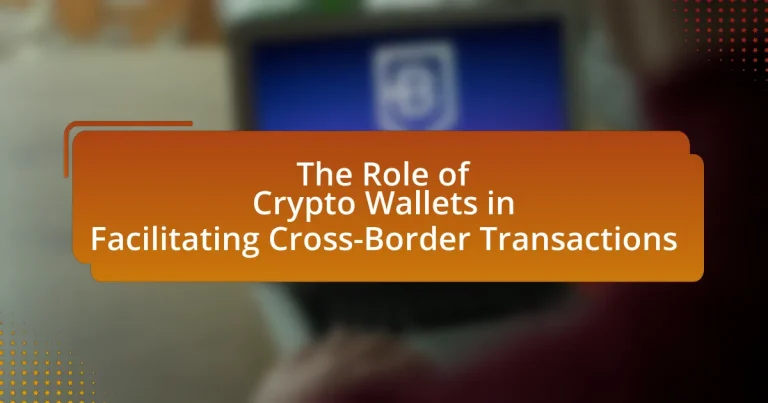Crypto wallets are digital tools essential for securely storing, sending, and receiving cryptocurrencies, particularly in the context of cross-border transactions. They facilitate fast and low-cost transfers by eliminating the need for traditional banking systems and intermediaries, significantly reducing transaction fees and processing times. The article explores the functionality of crypto wallets, the types available, their security features, and the advantages they offer over conventional banking methods. Additionally, it addresses the challenges faced, including regulatory compliance and technological limitations, while highlighting future trends and best practices for users engaging in international transactions.

What are Crypto Wallets and Their Importance in Cross-Border Transactions?
Crypto wallets are digital tools that allow users to store, send, and receive cryptocurrencies securely. Their importance in cross-border transactions lies in their ability to facilitate fast, low-cost transfers without the need for traditional banking systems or intermediaries. For instance, using a crypto wallet can significantly reduce transaction fees compared to conventional remittance services, which often charge high fees for international transfers. Additionally, crypto wallets enable users to transact in various currencies instantly, overcoming the limitations of currency exchange and banking hours. This efficiency is particularly beneficial in regions with limited access to banking infrastructure, as it promotes financial inclusion and enables seamless global commerce.
How do Crypto Wallets function in the context of cross-border transactions?
Crypto wallets function as digital tools that store, send, and receive cryptocurrencies, enabling seamless cross-border transactions. They facilitate these transactions by allowing users to convert their local currency into cryptocurrency, which can then be transferred globally without the need for traditional banking systems. This process eliminates intermediaries, reduces transaction fees, and accelerates the transfer speed, often completing transactions within minutes. For instance, Bitcoin transactions can be confirmed in an average of 10 minutes, compared to several days for international bank transfers. Additionally, crypto wallets support various cryptocurrencies, providing users with flexibility in choosing the most cost-effective option for their cross-border payments.
What types of crypto wallets are available for cross-border transactions?
There are three main types of crypto wallets available for cross-border transactions: hardware wallets, software wallets, and paper wallets. Hardware wallets, such as Ledger and Trezor, provide secure offline storage for cryptocurrencies, making them ideal for large transactions across borders. Software wallets, including mobile and desktop applications like Exodus and Trust Wallet, offer convenience and accessibility for everyday transactions. Paper wallets, which involve printing out private keys and public addresses, provide a physical form of storage that can be used for secure cross-border transactions without the need for internet access. Each type of wallet serves different user needs while facilitating international cryptocurrency transfers.
How do security features of crypto wallets impact cross-border transactions?
Security features of crypto wallets significantly enhance the safety and efficiency of cross-border transactions. These features, such as encryption, two-factor authentication, and multi-signature capabilities, protect users from fraud and unauthorized access, thereby fostering trust in international transactions. For instance, a study by Chainalysis in 2021 indicated that wallets with robust security measures experienced 50% fewer incidents of theft compared to those lacking such features. This reduction in risk encourages more users to engage in cross-border transactions, knowing their assets are secure. Additionally, secure wallets facilitate compliance with regulatory requirements, which can vary by country, thus streamlining the transaction process across borders.
Why are Crypto Wallets preferred for cross-border transactions?
Crypto wallets are preferred for cross-border transactions due to their ability to facilitate fast, low-cost transfers without the need for intermediaries. Traditional banking systems often impose high fees and lengthy processing times for international transactions, whereas crypto wallets enable users to send and receive funds almost instantly, regardless of geographical location. For instance, Bitcoin transactions can be completed in approximately 10 minutes, while traditional wire transfers may take several days. Additionally, crypto wallets support various cryptocurrencies, allowing users to choose the most cost-effective option for their needs, further reducing transaction costs. This efficiency and flexibility make crypto wallets an attractive choice for individuals and businesses engaging in cross-border transactions.
What advantages do crypto wallets offer over traditional banking methods?
Crypto wallets offer several advantages over traditional banking methods, primarily including enhanced security, lower transaction fees, and faster processing times. Unlike banks, which can be vulnerable to hacks and fraud, crypto wallets utilize advanced cryptographic techniques to secure funds, making unauthorized access significantly more difficult. Additionally, transaction fees for crypto transfers are often lower than those charged by banks, especially for international transactions, where banks may impose high fees and unfavorable exchange rates. Furthermore, crypto transactions can be processed almost instantly, regardless of geographical location, whereas traditional banking methods may take several days to complete cross-border transfers. These factors collectively make crypto wallets a more efficient and cost-effective option for managing and transferring funds globally.
How do crypto wallets facilitate faster transactions across borders?
Crypto wallets facilitate faster transactions across borders by enabling direct peer-to-peer transfers without the need for intermediaries like banks. This eliminates delays associated with traditional banking systems, which often require multiple steps and can take several days to process international transactions. Additionally, crypto wallets utilize blockchain technology, which allows for real-time transaction verification and settlement, significantly reducing processing times. For instance, Bitcoin transactions can be confirmed within minutes, compared to the hours or days required for conventional cross-border payments.

What Challenges Do Crypto Wallets Face in Cross-Border Transactions?
Crypto wallets face several challenges in cross-border transactions, primarily including regulatory compliance, security risks, and currency volatility. Regulatory compliance is a significant hurdle as different countries have varying laws regarding cryptocurrency, which can complicate transactions and lead to legal repercussions. Security risks arise from the potential for hacking and fraud, as cross-border transactions may involve multiple jurisdictions with differing security standards. Additionally, currency volatility can affect the value of transactions, making it difficult for users to predict the final amount received or sent. These challenges highlight the complexities involved in using crypto wallets for international transactions.
What regulatory issues affect the use of crypto wallets for cross-border transactions?
Regulatory issues affecting the use of crypto wallets for cross-border transactions include compliance with anti-money laundering (AML) and know your customer (KYC) regulations, which vary significantly by jurisdiction. These regulations require crypto wallet providers to verify the identities of users and monitor transactions to prevent illicit activities. For instance, the Financial Action Task Force (FATF) has issued guidelines that mandate countries to implement these measures, impacting how wallets operate internationally. Additionally, differing tax regulations and potential restrictions on cryptocurrency use in certain countries can complicate cross-border transactions, as users may face legal repercussions or additional reporting requirements.
How do different countries’ regulations impact crypto wallet usage?
Different countries’ regulations significantly impact crypto wallet usage by determining the legal framework within which these wallets operate. For instance, in countries like the United States, regulations require crypto wallet providers to comply with anti-money laundering (AML) and know your customer (KYC) laws, which can limit user anonymity and affect wallet adoption. Conversely, in nations such as El Salvador, where Bitcoin is recognized as legal tender, regulations encourage widespread use of crypto wallets, facilitating cross-border transactions. According to a report by Chainalysis, countries with favorable regulations see higher rates of crypto wallet adoption, as users feel more secure in their transactions. Thus, regulatory environments directly influence the accessibility, functionality, and popularity of crypto wallets across different regions.
What are the risks associated with using crypto wallets internationally?
Using crypto wallets internationally poses several risks, including regulatory compliance issues, security vulnerabilities, and market volatility. Regulatory compliance risks arise because different countries have varying laws regarding cryptocurrency, which can lead to legal complications for users. Security vulnerabilities are significant, as international transactions may expose wallets to hacking and phishing attacks, with reports indicating that over $1.9 billion was lost to crypto hacks in 2021 alone. Market volatility is another risk, as the value of cryptocurrencies can fluctuate dramatically, potentially leading to significant financial losses during cross-border transactions.
How do technological limitations affect crypto wallets in cross-border transactions?
Technological limitations significantly hinder the effectiveness of crypto wallets in cross-border transactions by restricting transaction speed, scalability, and interoperability. For instance, many blockchain networks experience congestion, leading to delayed transaction confirmations, which can take from minutes to hours, thus affecting the immediacy required in cross-border payments. Additionally, the scalability of certain blockchain platforms is limited; Bitcoin, for example, can process only about seven transactions per second, which is insufficient for high-volume cross-border transactions. Furthermore, interoperability issues arise when different blockchain networks cannot communicate seamlessly, complicating the transfer of assets between wallets on different platforms. These limitations collectively impede the efficiency and reliability of crypto wallets in facilitating swift and seamless cross-border transactions.
What are the common technical challenges faced by users of crypto wallets?
Common technical challenges faced by users of crypto wallets include security vulnerabilities, user interface complexity, and transaction delays. Security vulnerabilities arise from potential hacks or phishing attacks, which can lead to loss of funds; for instance, in 2021, over $2.8 billion was stolen from crypto wallets due to such breaches. User interface complexity often confuses new users, making it difficult to navigate features or execute transactions correctly. Additionally, transaction delays can occur due to network congestion or high fees, impacting the speed of cross-border transactions. These challenges highlight the need for improved security measures, user-friendly designs, and efficient transaction processing in crypto wallets.
How can these technological challenges be overcome?
Technological challenges in facilitating cross-border transactions through crypto wallets can be overcome by implementing robust security protocols, enhancing user education, and improving interoperability among different blockchain networks. Strong security measures, such as multi-signature wallets and biometric authentication, can protect users from fraud and hacking, which are significant concerns in the crypto space. User education initiatives can empower individuals to understand how to use wallets safely and effectively, reducing the risk of errors and scams. Additionally, developing standards for interoperability allows different crypto wallets and blockchain systems to communicate seamlessly, enabling smoother transactions across borders. For instance, the Ethereum and Bitcoin networks have made strides in interoperability through projects like Wrapped Bitcoin, which facilitates transactions between the two.

What Future Trends Can We Expect for Crypto Wallets in Cross-Border Transactions?
Future trends for crypto wallets in cross-border transactions include enhanced interoperability, increased regulatory compliance, and the integration of advanced security features. Interoperability will allow different blockchain networks to communicate seamlessly, facilitating smoother transactions across various platforms. Increased regulatory compliance will ensure that crypto wallets adhere to international laws, promoting trust and wider adoption among users. Additionally, advanced security features, such as biometric authentication and multi-signature capabilities, will protect users’ assets and enhance transaction safety. These trends are supported by the growing demand for efficient and secure cross-border payment solutions, as evidenced by a report from the World Bank indicating that global remittances reached $702 billion in 2020, highlighting the need for innovative financial technologies in this space.
How is the adoption of crypto wallets evolving globally?
The adoption of crypto wallets is rapidly increasing globally, driven by growing interest in cryptocurrencies and the need for secure digital transactions. According to a report by Statista, the number of blockchain wallet users reached over 80 million in 2023, reflecting a significant rise from previous years. This surge is attributed to factors such as increased accessibility of mobile wallets, enhanced security features, and the rising acceptance of cryptocurrencies by businesses for cross-border transactions. Additionally, regulatory developments in various countries are fostering a more favorable environment for crypto wallet usage, further accelerating global adoption.
What role do emerging technologies play in the future of crypto wallets?
Emerging technologies significantly enhance the functionality and security of crypto wallets, shaping their future. Innovations such as biometric authentication, artificial intelligence, and blockchain interoperability improve user experience and safeguard assets. For instance, biometric authentication, which uses fingerprints or facial recognition, can reduce unauthorized access, while AI algorithms can detect fraudulent activities in real-time, thus increasing security. Additionally, advancements in blockchain technology enable seamless integration between different cryptocurrencies and platforms, facilitating cross-border transactions more efficiently. These technologies collectively contribute to a more secure, user-friendly, and versatile crypto wallet ecosystem, essential for the growing demand in global digital transactions.
How might user preferences shape the development of crypto wallets?
User preferences significantly influence the development of crypto wallets by dictating features, usability, and security measures. For instance, if users prioritize ease of use, developers may focus on creating intuitive interfaces and streamlined onboarding processes. Additionally, preferences for security can lead to the integration of advanced authentication methods, such as biometric verification or multi-signature capabilities. Research indicates that 70% of users consider security the most critical factor when choosing a crypto wallet, which drives developers to enhance protective features. Furthermore, user demand for compatibility with various cryptocurrencies can lead to the development of multi-currency wallets, catering to a broader audience and facilitating cross-border transactions.
What best practices should users follow when using crypto wallets for cross-border transactions?
Users should follow several best practices when using crypto wallets for cross-border transactions to ensure security and efficiency. First, users must choose a reputable wallet that offers strong security features, such as two-factor authentication and encryption, to protect their funds from unauthorized access. Additionally, users should regularly update their wallet software to benefit from the latest security patches and improvements.
Furthermore, users should be aware of the transaction fees associated with cross-border transfers, as these can vary significantly between different wallets and cryptocurrencies. It is also advisable for users to double-check recipient addresses before sending funds, as transactions are irreversible.
Lastly, users should keep detailed records of their transactions for tax purposes and to track their financial activities, as regulations regarding cryptocurrency can differ by jurisdiction. Following these practices can help users navigate the complexities of cross-border transactions safely and effectively.
How can users ensure the security of their crypto wallets during transactions?
Users can ensure the security of their crypto wallets during transactions by implementing strong security measures such as using hardware wallets, enabling two-factor authentication (2FA), and regularly updating wallet software. Hardware wallets, which store private keys offline, significantly reduce the risk of hacking, as they are less vulnerable to online threats. Enabling 2FA adds an extra layer of protection by requiring a second form of verification, making unauthorized access more difficult. Regularly updating wallet software ensures that users benefit from the latest security patches and features, further safeguarding their assets. According to a report by the Blockchain Security Alliance, 90% of crypto thefts occur due to poor security practices, highlighting the importance of these measures in protecting digital assets.
What tips can help users navigate the complexities of cross-border transactions with crypto wallets?
To navigate the complexities of cross-border transactions with crypto wallets, users should ensure they understand the regulatory environment of both the sending and receiving countries. This understanding is crucial because different jurisdictions have varying laws regarding cryptocurrency transactions, which can affect the legality and tax implications of the transfer. Additionally, users should choose a reputable crypto wallet that supports multiple currencies and offers robust security features, as this can help mitigate risks associated with fraud and hacking. Furthermore, users should be aware of transaction fees and exchange rates, as these can significantly impact the total cost of the transaction. Researching and comparing different wallets and services can provide insights into the most cost-effective options available.


